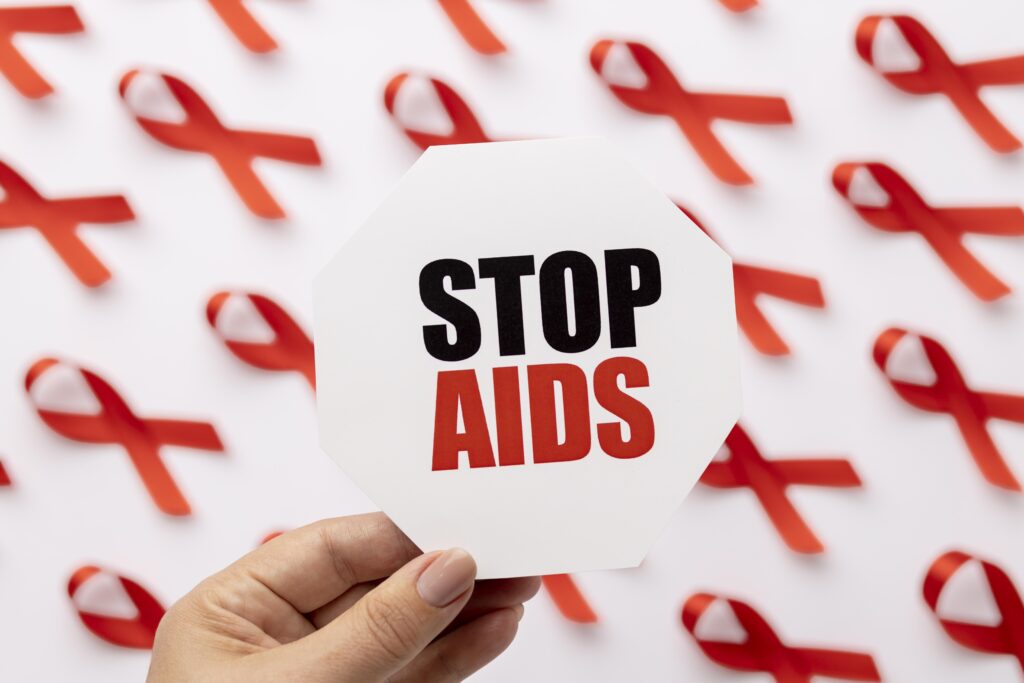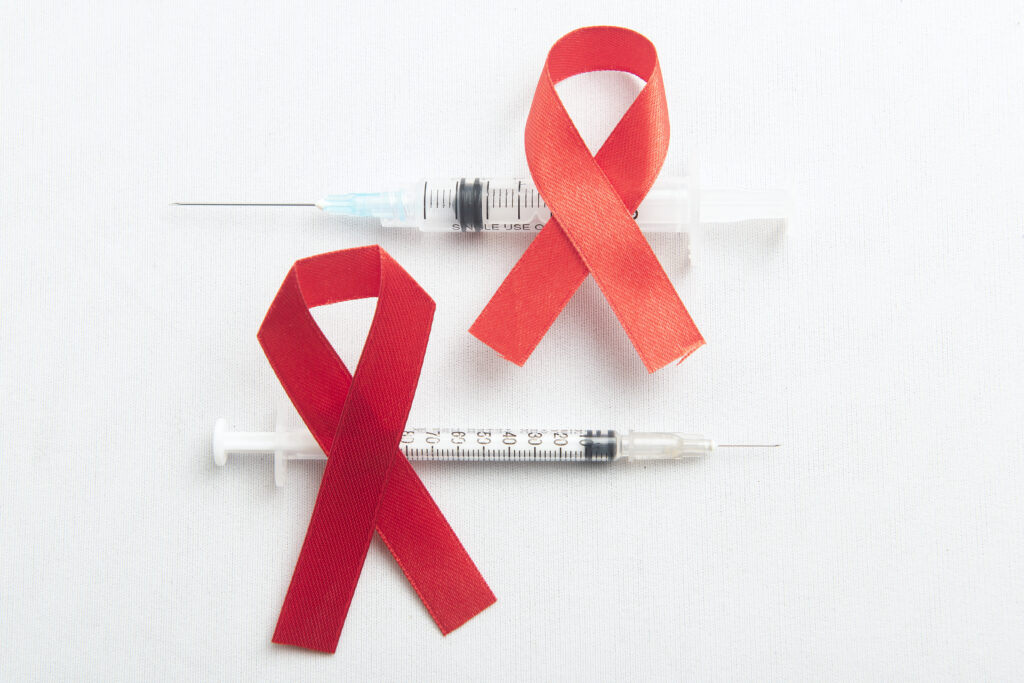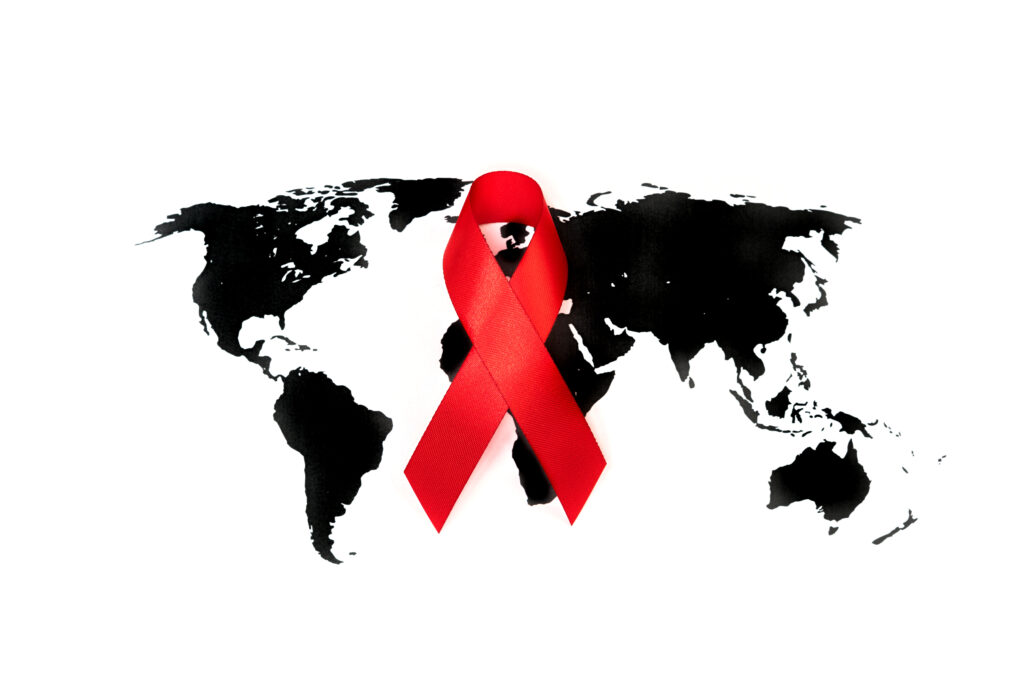HIV PREVENTION
Prevention of hiv
In the ongoing battle against HIV transmission, a range of preventative measures offers robust options. Abstinence remains foundational, while consistent condom use provides a physical barrier during sexual intercourse. Avoiding needle sharing among people who inject drugs is crucial. Pre-exposure prophylaxis (PrEP) offers high-risk individuals effective protection, complemented by post-exposure prophylaxis (PEP) for potential exposures. Antiretroviral therapy (ART) not only treats HIV but also prevents transmission by suppressing the virus to undetectable levels, emphasizing comprehensive strategies in promoting public health and preventing new infections.



Taking HIV medication maintains personal
health and prevents virus transmission
HIV treatment involves highly effective medication that reduces the viral load in your body. It’s recommended for everyone with HIV, with immediate initiation upon diagnosis, even on the same day. Treatment typically consists of a daily regimen of three HIV medicines from different drug classes, often combined into a single pill. For some, long-acting injections every two months may be an option. When taken as prescribed, HIV medication suppresses the virus to very low levels, maintaining immune function and preventing illness. Viral suppression is typically defined as fewer than 200 copies of HIV per milliliter of blood.
HIV medication can lower your viral load to undetectable levels, often within 6 months of starting treatment. Maintaining an undetectable viral load offers significant health benefits, enabling individuals to lead long and healthy lives. Moreover, it prevents HIV transmission to HIV-negative partners through sex, emphasizing the importance of adherence to medication and regular monitoring.
Keep Your Viral Load Undetectable
Utilizing HIV medication as prevention, known as Treatment as Prevention (TasP), involves taking antiretroviral therapy (ART) as prescribed to achieve and maintain an undetectable viral load, reducing transmission risk. Adhering to medication regimens supports personal health, prevents viral replication, and minimizes the chance of transmitting HIV to HIV-negative partners through sexual activity.
If you’ve discontinued your HIV medication or face challenges in adhering to the prescribed doses, promptly consult your healthcare provider. They can assist in resuming treatment and advise on effective strategies to prevent HIV transmission to sexual partners until your viral load returns to an undetectable level.

FAQ’s
What Is Treatment as Prevention?
Treatment as Prevention (TasP) involves using HIV medication to prevent the sexual transmission of HIV. When someone with HIV takes their medication consistently and maintains an undetectable viral load, they can lead a healthy life and will not transmit HIV to their HIV-negative partners through sexual activities. This concept is often referred to as undetectable = untransmittable (U=U).
TasP is highly effective when individuals with HIV adhere to their medication regimen and receive regular follow-up care, including routine viral load monitoring to ensure their viral load remains undetectable.
Taking HIV Medicine to Stay Healthy and Prevent Transmission
HIV treatment involves taking highly effective medication to reduce the amount of HIV in your body. It’s recommended for everyone with HIV, and starting treatment immediately after diagnosis is encouraged, even on the same day.
Typically, HIV treatment includes a combination of medications taken daily. This regimen usually consists of three HIV medicines from different drug classes. Many people take these medications in a single pill. For some, long-acting injections every two months are also an option.
When taken correctly, HIV medication lowers your viral load (the amount of HIV in your blood) to a very low level, known as viral suppression. This helps your immune system function properly and prevents illness. In some cases, the viral load becomes so low that it can’t be detected by standard lab tests, known as having an undetectable viral load. Most people achieve this within six months of starting treatment.
Having an undetectable viral load not only benefits your health but also prevents HIV transmission to your HIV-negative partners during sex. Overall, adhering to HIV treatment and achieving an undetectable viral load can lead to a long and healthy life.
How Do We Know Treatment as Prevention Works?
Research has demonstrated that effective HIV treatment not only benefits the individual’s health but also serves as a powerful tool for preventing the transmission of HIV to others. Studies involving thousands of mixed-status couples have shown that when the HIV-positive partner maintains an undetectable viral load through consistent medication use, there were no instances of HIV transmission to the HIV-negative partner during sexual activities such as vaginal, anal, or oral sex.
Apart from preventing sexual transmission, there are additional benefits of maintaining an undetectable viral load through HIV treatment:
1. It reduces the risk of HIV transmission from a parent to a child during pregnancy, labor, and delivery. By taking HIV medication as prescribed throughout pregnancy and providing the infant with medication for a specific period after birth, the risk of transmitting HIV to the baby can be minimized to 1% or less.
2. While it significantly reduces the risk, it doesn’t completely eliminate the possibility of HIV transmission through breastfeeding. Therefore, the current recommendation in the United States is for mothers with HIV to avoid breastfeeding their infants.
3. There’s a potential reduction in HIV transmission risk among people who inject drugs. However, more data is needed to determine the exact level of risk reduction associated with having a suppressed or undetectable viral load. It’s crucial for individuals who inject drugs to use new equipment each time and avoid sharing needles and syringes with others, even if they are on HIV medication and have an undetectable viral load.
Talk with Your Health Care Provider about Getting to Undetectable
It’s important to have open discussions with your healthcare provider about the benefits of HIV treatment and finding the right HIV medicine for your specific situation. Your healthcare provider can also advise you on how often you should get your viral load tested to ensure it remains undetectable. If your lab results indicate detectable virus or if you’re struggling to take your medication consistently, it’s crucial to explore other methods of preventing HIV transmission during sex, such as using condoms, practicing safer sex, and considering pre-exposure prophylaxis (PrEP) for an HIV-negative partner until your viral load becomes undetectable again. Additionally, if there’s a potential exposure to HIV (e.g., condom breakage during sex), discuss post-exposure prophylaxis (PEP) with your partner.
Keep in mind that while maintaining an undetectable viral load helps prevent HIV transmission, it doesn’t protect against other sexually transmitted infections (STIs). Therefore, it’s essential to talk to your provider about strategies to prevent other STIs as well.
Treatment as Prevention (TasP) can be a powerful tool when managing HIV, and it can be used either on its own or in combination with other prevention strategies. It’s crucial to have open and honest discussions about your HIV status with your sexual partners and mutually decide which prevention methods to incorporate into your sexual practices. It’s worth noting that some states have laws that mandate disclosing your HIV status to your sexual partner in specific situations, so it’s essential to be aware of and comply with legal requirements regarding HIV disclosure.

